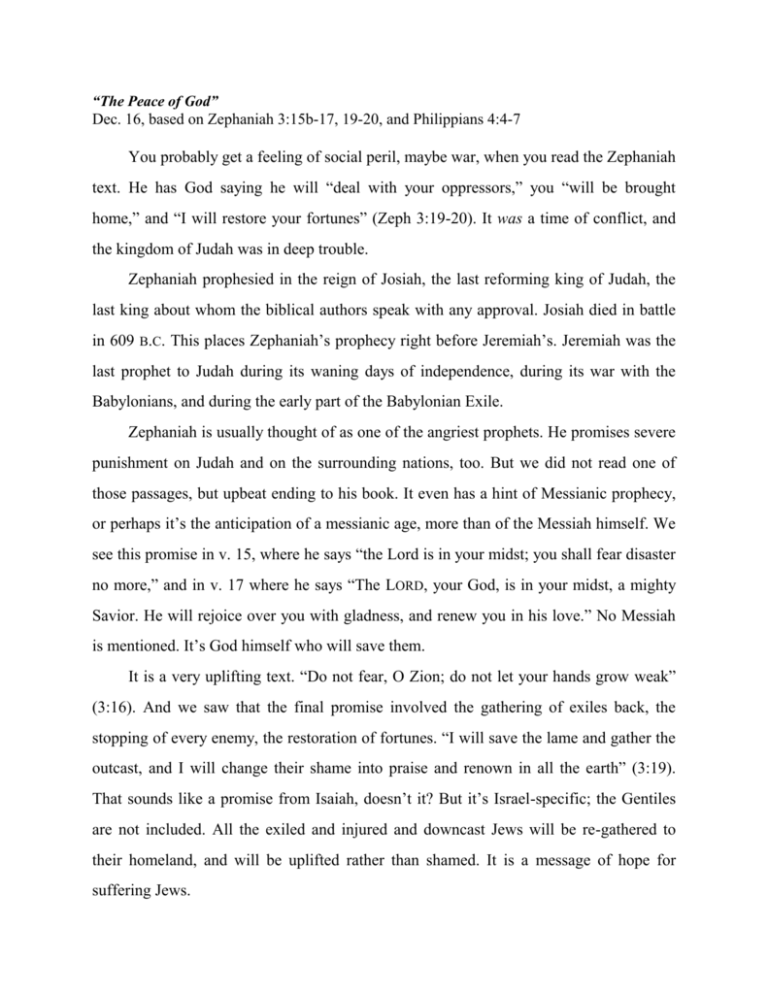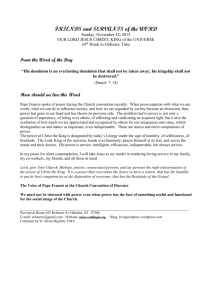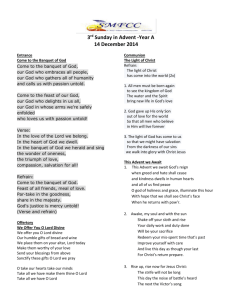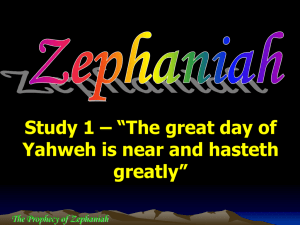The Peace of God
advertisement

“The Peace of God” Dec. 16, based on Zephaniah 3:15b-17, 19-20, and Philippians 4:4-7 You probably get a feeling of social peril, maybe war, when you read the Zephaniah text. He has God saying he will “deal with your oppressors,” you “will be brought home,” and “I will restore your fortunes” (Zeph 3:19-20). It was a time of conflict, and the kingdom of Judah was in deep trouble. Zephaniah prophesied in the reign of Josiah, the last reforming king of Judah, the last king about whom the biblical authors speak with any approval. Josiah died in battle in 609 B.C. This places Zephaniah’s prophecy right before Jeremiah’s. Jeremiah was the last prophet to Judah during its waning days of independence, during its war with the Babylonians, and during the early part of the Babylonian Exile. Zephaniah is usually thought of as one of the angriest prophets. He promises severe punishment on Judah and on the surrounding nations, too. But we did not read one of those passages, but upbeat ending to his book. It even has a hint of Messianic prophecy, or perhaps it’s the anticipation of a messianic age, more than of the Messiah himself. We see this promise in v. 15, where he says “the Lord is in your midst; you shall fear disaster no more,” and in v. 17 where he says “The LORD, your God, is in your midst, a mighty Savior. He will rejoice over you with gladness, and renew you in his love.” No Messiah is mentioned. It’s God himself who will save them. It is a very uplifting text. “Do not fear, O Zion; do not let your hands grow weak” (3:16). And we saw that the final promise involved the gathering of exiles back, the stopping of every enemy, the restoration of fortunes. “I will save the lame and gather the outcast, and I will change their shame into praise and renown in all the earth” (3:19). That sounds like a promise from Isaiah, doesn’t it? But it’s Israel-specific; the Gentiles are not included. All the exiled and injured and downcast Jews will be re-gathered to their homeland, and will be uplifted rather than shamed. It is a message of hope for suffering Jews. 2 This makes me think of the horrible crime committed in Newton, CT on Friday, and the shattered hopes of the people of that town. There is no way to eliminate the loss that parents, grandparents, brothers, sisters, aunts, uncles, and church members in that city have suffered. Even the person with the staunchest faith and the strongest assurance of an afterlife will feel the loss as a pain that may diminish with time, but will never depart. Even in God’s good universe, it is possible to inflict terrible suffering. But the criminal cannot deprive anyone of their chance for eternal life. He robbed some people of their earthly life, but he cannot rob anyone (but himself) of eternal life. For the survivors and relatives, it is their faith that will carry them through. God will go with them through every experience, every sorrow. Of course, the Hebrew prophets were well acquainted with sorrow, with tragedy, and they saw more tragedy coming. And this makes their hopeful passages all the more remarkable. This passage, which is the ending of the book of Zephaniah, seems to be a sort of an Advent text for the Jews, the Advent of a new age, that is. Advent means something different for Christians. We believe the Advent has happened, the new age has begun, the Messiah and Revealer came, the Spirit was poured out, and whoever is in Christ is in the kingdom of God. We learn about love and truth and peace from the Prince of Peace. We see more than the prophets could see, not because we are greater, but because we have been given a greater revelation. I think this is what Jesus meant when he said “among those born of women no one has arisen greater than John the Baptist; yet the least in the kingdom of heaven is greater than he” (Matt 11:11). He meant his followers have received a greater revelation than John the Baptist did. He does not mean they are greater or more courageous persons. That would hardly be possible. We have received a greater revelation of what the Messiah is and does, and what love is and does, than even the greatest of prophets received. 3 So it is no “knock” on Zephaniah when I say that we all should have a clearer idea than Zephaniah had of who the Messiah is, what he stands for, how he embodies love, what his Spirit is, and how he guides us. The Apostle Paul had a good idea of these things. In this Philippians passage he says, “let your gentleness be known to everyone,” and “The Lord is near” (Phil 4:5). He seems to mean that the Lord is near at all times, whether he is coming soon or not. In First Thessalonians, Paul thought the Lord was coming soon. Here in Philippians he probably no longer thinks that, so he is able to make the more awesome and important statement, “The Lord is near”—near to all, and near at all times—to those who are “in Christ.” What does this phrase “in Christ” mean? He uses it dozens of times in his letters. It has several meanings, and I’m going to organize them by sets of meanings. First “in Christ” means abiding in Christ, belonging to Christ, having Christ’s spirit within, and being led by Christ. Something close to this meaning shows up in v. 6: “Do not worry about anything, but in everything by prayer and supplication with thanksgiving let your requests be made known to God.” And the strength derived from this experience shows up in his immortal statement in chapter 4: “I can do all things through him who strengthens me” (4:13). But “in Christ” also has a more mystical or participatory meaning, because it means being connected to the Messiah, suffering as he suffered, and some day arising as he arose, with a new, spiritual body, being “conformed to the body of his glory,” as he says in this letter (3:21). It was this participatory meaning, this notion of actually replicating the Messiah’s experience, that was hard for people to understand, and the idea was soon lost. Paul was mostly misunderstood, even by those who considered themselves his loyal followers. Do not feel alone if you have difficulty understanding Paul; even Second Peter says Paul wrote “some things” that are “hard one to understand” (2 Pet 3:16). 4 Finally Paul’s phrase “in Christ” has a communal meaning: being bonded with all the other people who are in Christ, being part of the body of Christ. In the passage that follows our quote, he urges the church to think on whatever is honorable, whatever is just, whatever is excellent (4:8). He tells them that “my God will fully satisfy every need of yours according to his riches in glory in Christ Jesus” (4:19). It’s not entirely clear what “according to” means in this sentence. It seems to mean God will satisfy our needs out of the abundant riches of love that are embodied in Christ Jesus. In the final verse of today’s reading, Paul promises that “the peace of God, which surpasses all understanding, will guard your hearts and your minds in Christ Jesus” (4:7) How can I describe what that is like? I experience it from time to time. Maybe you have, as well. It comes with a feeling of trust and warmth, a kind of surety that can’t be described. Even in this tragic week when another terrible disaster has struck an American neighborhood, we can —and we need to—feel the surety that is offered by faith. We need to keep practicing love toward one another, whether there has been a recent tragedy or not. The love of God does not change, although it may change tactics, when faced with different circumstances. The love of God is not changed by anything that happens. And our dedication to the will of God needs to be unchangeable by any events that happen around us, good or bad. This is parental love, like the love of God. Parental love is not changed by things that happen. The offer is not withdrawn, the forgiveness is never withdrawn, although people can withdraw themselves, can harden their hearts against the offer to join the family of God. All are welcome, all who are willing to join as a little child, with no special privileges, no promises of power or vengeance. Just simply come in. And pity those who decline such a generous offer. They can cause us sorrow, but they cannot separate us—they cannot separate anyone—from the love of God.










